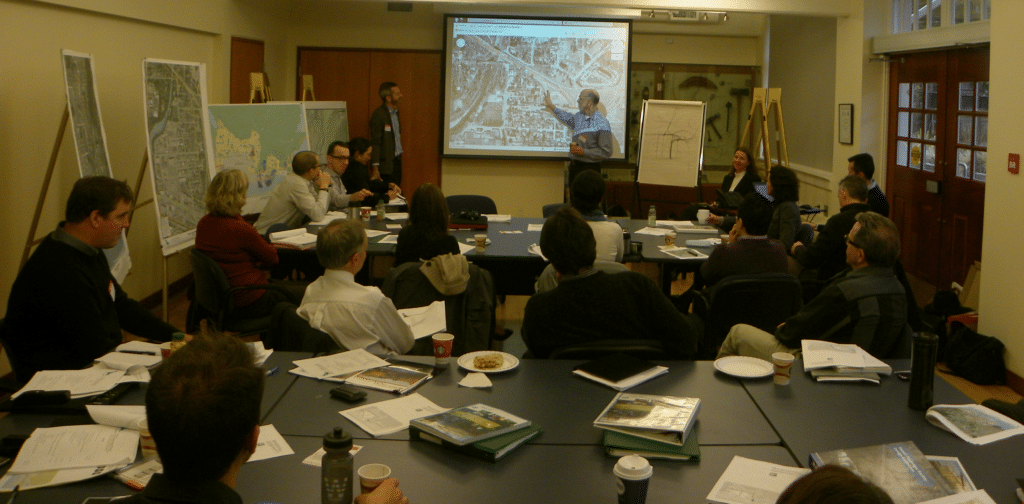The District of North Vancouver (DNV) and Vancouver Coastal Health (VCH) pursued a partnership for the DNV’s first review of their Official Community Plan (OCP) in 20 years. Through an extensive public engagement process that reached over 5000 people over 2 years, the DNV and VCH were able to stimulate meaningful discussion with community members, learn more about the needs of the community, and raise public awareness about how the built environment can impact health. Through the strong partnerships created and a continuous transparent public engagement process, the DNV has developed a comprehensive OCP that prioritizes sustainability, community health promotion and prevention. Numerous projects, programs, and policies that promote health and wellbeing in North Vancouver have followed as a result of the planning process, titled Identity DNV 2030.
The Plan was developed through ongoing consultation with the community, stakeholders and other local, regional, provincial, federal and First Nations governments including with local Squamish First Nation and Tsleil-Waututh Nation representatives. Consultation for the health and wellbeing aspects of the plan included many local community service groups.
Key Partnerships & Stakeholders in Community Health
- District of North Vancouver
- Vancouver Coastal Health
- Heart and Stroke Foundation
- City of North Vancouver
- District of West Vancouver
- Metro Vancouver
- TransLink
- School District 44
Summary of the Process
VCH and the DNV identified that they shared an interest in improving the overall health of the community through healthy community design and land use, and thus saw a strategic opportunity to build a partnership. This partnership helped reach a new audience – people who are interested in the topic of health, but may not initially see the connection between an OCP, community design, and their passion for health. The community and the health authority developed a memorandum of understanding to formalize their partnership on the Identity DNV 2030 OCP planning process.
Some of the key planning priorities in North Vancouver’s OCP review include: creating a network of neighbourhood centres; meeting the housing and community service needs of an aging population; and developing policies that create an inclusive and sustainable community. VCH participated in public engagement events, prepared policy briefs, offered the Medical Health Officer as a valuable resource and speaker, and reviewed drafts of the OCP with a specialized ‘health lens’. As a result of the input from VCH and other health stakeholders, the OCP included a strong rationale and policies about vibrant community design, active transportation, housing needs, and food security.
The DNV also partnered with the Heart and Stroke Foundation and VCH to lead neighbourhood walkability audit workshops in the community in 2011-2012. Residents were invited to an evening gathering to eat, talk and walk their neighbourhood and discuss healthy community land use and design in the context of their own neighbourhood. Participants looked at mixed land use, development types, the public realm, and walkability features and provided input to the planning process based on what they observed and aspire towards in their own neighbourhood.
The public engagement process provided invaluable insight regarding the community’s needs while also generating meaningful discussion about the public’s vision for the OCP. This input assisted with the decision making process around the new OCP. With this involvement from numerous stakeholders during each phase of Identity DNV 2030, the OCP was finalized and adopted by council in June 2011.
Key Outcomes & Impacts
The Identity DNV 2030 OCP planning process is an exemplary illustration of integrating a health lens into bylaws and developing healthy public policy. The OCP has catalyzed numerous actions that aim to develop a sustainable community. Below are some key actions that have resulted, while more can be found on the Identity OCP website:
One of the highest priorities within the OCP is to develop four town centres that incorporate the Smart Growth Principles (i.e., density, connectivity, walkability, mixed-land use, compact neighbourhoods, preserve open space) to create a healthy built environment, promote environmental sustainability, and improve social well-being. Currently, several implementation plans have been completed for each of these town centres and others are in progress. Meaningful community engagement continues as part of the implementation and monitoring process.
In alignment with the OCP, the new ten-year Parks and Open Space Strategic Plan (POSSP) was created to provide direction for the development and upkeep of the DNV’s parks and open spaces. This strategic action plan supports OCP policies, and identifies feasible, cost effective programs and actions related to parks and open space.
To provide a sustainable transportation network, create pedestrian friendly communities, promote safer driving, and offer alternative transportation systems, council adopted a Transportation Plan in 2012. This Plan supports the land uses and networks of the four centres identified in the OCP.
A new cultural plan is currently under development as a result of the OCP goals. This policy document will help to re-envision the development of arts and culture in the DNV.
For more information, please contact:
Annie Mauboules
Social Planner
District of North Vancouver
T: 604-990-2454
E: mauboulesa@dnv.org





